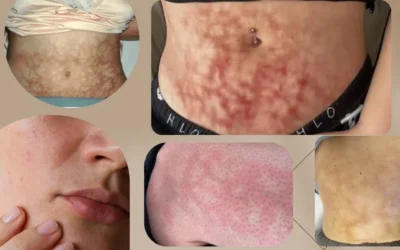When it comes to achieving clear and radiant skin, the solution may be as simple as staying hydrated. Water plays a vital role in maintaining skin health and overall well-being.
In this comprehensive guide, we will explore the relationship between water intake and clear skin, uncover the benefits of hydration, and provide practical tips on how much water you should drink to promote a healthy complexion.
Get ready to quench your skin’s thirst and unlock the secret to a hydrated and glowing appearance.
The Importance of Hydration for Skin Health
Water is an essential component for our body’s functions, and the skin is no exception. Understanding the significance of hydration for skin health is key to unlocking clear and radiant skin. Let’s explore its benefits:
Moisture Balance: Proper hydration helps maintain the skin’s moisture balance, preventing dryness, flakiness, and tightness.
Improved Elasticity: Well-hydrated skin tends to be more supple and elastic, reducing the appearance of fine lines and wrinkles.
Enhanced Skin Barrier: A well-hydrated skin barrier acts as a protective shield, preventing irritants and pollutants from penetrating the skin.
Skin Cell Renewal: Water aids in the process of skin cell turnover, helping to shed dead skin cells and promote the growth of new, healthy cells.
By prioritizing hydration, you can support your skin’s natural functions and promote a clear and vibrant complexion.
Determining Your Water Intake Needs
While the importance of hydration is clear, the question remains: How much water should you drink for clear skin? Let’s explore some factors to consider:
Individual Factors: Water intake needs vary depending on factors such as age, weight, activity level, and climate. Consider these factors when determining your daily water intake.
General Guideline: As a general guideline, aim to drink at least eight 8-ounce glasses of water per day, known as the 8×8 rule. However, this may vary depending on individual circumstances.
Thirst as a Guide: Pay attention to your body’s thirst signals. If you feel thirsty, it’s an indication that your body needs hydration.
Physical Activity: Engaging in physical activities that induce sweating requires increased water intake to compensate for fluid loss.
It’s important to note that water intake should be supplemented by consuming water-rich foods, such as fruits and vegetables, to further support hydration.
Tips for Increasing Water Intake
Now that you understand the significance of hydration and how to determine your water intake needs, let’s explore practical tips to increase your water consumption:
Carry a Water Bottle: Keep a reusable water bottle with you throughout the day as a visual reminder to drink water.
Set Reminders: Use alarms or smartphone apps to remind yourself to drink water at regular intervals.
Infuse with Flavor: If you find plain water boring, infuse it with natural flavors by adding slices of fruits, herbs, or a splash of citrus juice.
Track Your Intake: Keep a log or use smartphone apps to track your daily water intake. This can help you stay accountable and ensure you’re meeting your hydration goals.
Alternate Beverages: Replace sugary drinks and excessive caffeine with water or herbal tea to hydrate your body without the added sugars and potential dehydrating effects.
Incorporating these simple habits into your daily routine can make a significant difference in meeting your hydration goals and achieving clear and healthy skin.
Hydration as Part of Your Skincare Routine
Hydration goes beyond just drinking water—it’s also about incorporating it into your skincare routine. Here’s how you can maximize the benefits of water for your skin:
Cleansing: Start your skincare routine with a gentle cleanser that effectively removes impurities without stripping away natural oils. Look for cleansers that hydrate and nourish the skin.
Toner: After cleansing, apply a hydrating toner to replenish moisture and prepare your skin for the subsequent skincare steps.
Serums and Moisturizers: Opt for serums and moisturizers that contain hydrating ingredients such as hyaluronic acid, glycerin, or ceramides. These help lock in moisture and provide long-lasting hydration.
Face Mists: Throughout the day, use a facial mist to provide an instant boost of hydration, especially in dry or air-conditioned environments.
Sheet Masks: Treat your skin to a hydrating sheet mask once or twice a week to infuse it with concentrated moisture and rejuvenate the complexion.
By incorporating hydration-focused products into your skincare routine, you can enhance the overall moisture levels of your skin and support its clarity and health.
Additional Tips for Clear and Hydrated Skin
In addition to drinking enough water and incorporating hydration into your skincare routine, consider these extra tips to promote clear and hydrated skin:
Balanced Diet: Consume a balanced diet rich in fruits, vegetables, and healthy fats, as they provide essential nutrients that support skin health.
Humidifier: If you live in a dry climate or during the winter months when the air tends to be drier, use a humidifier to add moisture to the environment and prevent your skin from becoming dehydrated.
Avoid Excessive Heat: Excessive heat, such as hot showers or prolonged exposure to hot environments, can strip your skin of its natural oils and lead to dehydration. Opt for lukewarm showers and protect your skin from excessive sun exposure.
Limit Alcohol and Caffeine: Both alcohol and caffeine can dehydrate your body, so consume them in moderation and balance them with sufficient water intake.
By incorporating these additional tips into your lifestyle, you can optimize your efforts to achieve clear and hydrated skin.
Cleanse Gently: When dealing with acne-prone skin, it’s important to cleanse your face gently to avoid aggravating existing breakouts or causing further irritation.
Use a mild, non-comedogenic cleanser that is specifically formulated for acne-prone skin. Avoid harsh scrubbing or using abrasive exfoliants, as they can worsen inflammation.
Avoid Pore-Clogging Ingredients: Be mindful of the skincare products and cosmetics you use, as certain ingredients can clog your pores and contribute to acne.
Look for non-comedogenic and oil-free products that are less likely to cause breakouts. Read the labels and avoid ingredients such as mineral oil, petrolatum, and heavy emollients.
Spot Treatment for Breakouts: When a breakout occurs, it’s helpful to have a spot treatment on hand to target specific blemishes. Look for products containing ingredients like benzoyl peroxide, salicylic acid, or tea tree oil, as they can help reduce inflammation and promote healing.
Use Oil-Free and Lightweight Moisturizers: While it’s essential to keep your skin moisturized, choose oil-free and lightweight moisturizers that won’t clog your pores. Look for non-comedogenic formulas that provide hydration without adding unnecessary oiliness.
Sun Protection: Protecting your skin from the sun’s harmful UV rays is crucial for overall skin health and preventing acne scars and hyperpigmentation.
Apply a broad-spectrum sunscreen with an SPF of 30 or higher, even on cloudy days. Look for oil-free or non-comedogenic sunscreen formulas to avoid pore congestion.
Healthy Diet and Lifestyle: Maintaining a healthy diet and lifestyle can significantly impact the clarity of your skin. Opt for a balanced diet rich in fruits, vegetables, whole grains, and lean proteins.
Avoid excessive consumption of sugary and processed foods, as they can contribute to inflammation and breakouts. Additionally, prioritize regular exercise, stress management techniques, and sufficient sleep to support overall skin health.
Don’t Pick or Pop: As tempting as it may be, avoid picking or popping your acne lesions. This can lead to further inflammation, infection, and scarring. Instead, practice gentle skincare techniques and consult with a dermatologist for proper treatment options if needed.
Manage Stress: Stress can exacerbate acne and contribute to hormonal imbalances that affect the skin.
Incorporate stress-management techniques such as meditation, deep breathing exercises, or engaging in activities you enjoy to promote overall well-being and reduce the impact of stress on your skin.
Consult a Dermatologist: If you’re struggling with persistent acne or have severe breakouts, it’s advisable to consult a dermatologist. They can provide personalized advice, recommend prescription medications or treatments, and guide you on the best approach to clearing your skin.
Remember, achieving clear and healthy skin is a holistic process that requires a combination of hydration, skincare, and a healthy lifestyle. By prioritizing hydration, you’re taking a crucial step towards unlocking the secret to radiant skin.
So grab that water bottle, sip mindfully, and watch your skin glow with health and vitality.


